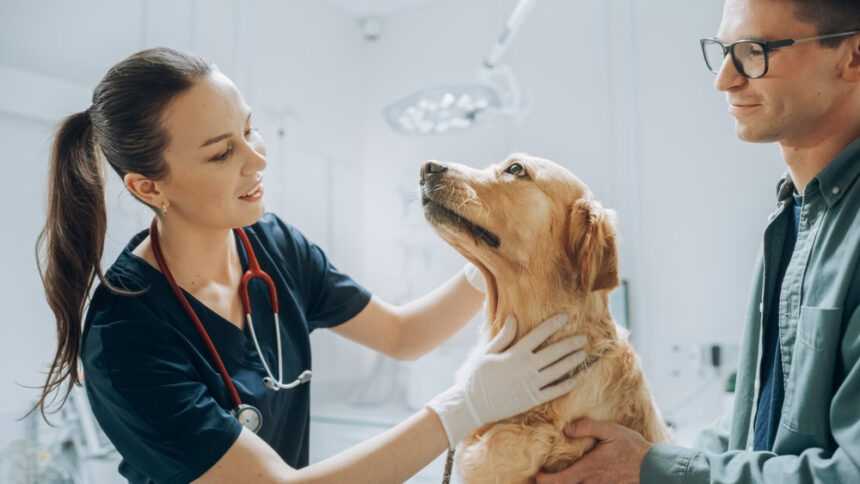PTSD, or post-traumatic stress dysfunction, is well-known and documented in folks. A few of us could know somebody who was within the service that suffers from PTSD after experiencing the horrors of fight. Nonetheless, PTSD can happen following nearly any kind of traumatic expertise, whether or not acute or extended. So, is it attainable for canine to additionally undergo from PTSD? Whereas it could be troublesome to definitively diagnose a canine with PTSD, we will completely see indicators that mirror what’s exhibited in folks with PTSD. It’s essential to notice up entrance that if you happen to join with this text and suspect your canine could have PTSD, contacting a veterinary behaviorist could also be in the most effective curiosity of your loved ones and your canine.

What Is PTSD?
PTSD stands for post-traumatic stress dysfunction. Per Mayo Clinic, as PTSD pertains to people, it’s a “psychological well being situation that’s attributable to an especially worrying or terrifying occasion – both being a part of it, or witnessing it”.1 Simply witnessing or being a part of a traumatic occasion doesn’t essentially imply that an individual and/or an animal will undergo from PTSD. There are canine who undergo horrific abuse and/or neglect conditions who go on to regulate completely properly to their fantastic new houses. My canine is a good instance of that. After being uncared for and tied in a yard for who is aware of how lengthy, he turned tangled within the rope he was tethered to. This resulted within the lack of certainly one of his again legs. Regardless of that have, he is likely one of the most loving, energetic, and trusting of people canine I’ve ever met. If in case you have meals and a snuggle for him, he’s immediately your buddy. I’m stunned every day that he doesn’t undergo any apparent, long-term trauma or PTSD from his earlier dwelling state of affairs.
The distinction is that when a canine witnesses or goes by a traumatic expertise and doesn’t enhance with time, love, coaching, and work, or if the damaging signs of their expertise worsen over time, then they might have PTSD.

What Are the Indicators of PTSD In a Canine?
That is the place the issue lies in diagnosing PTSD in our canine. Partially as a result of typically, we don’t know a lot about their lives earlier than they got here to us, a shelter, or a rescue. We’ll typically see a canine who’s fearful, shut down, aggressive, and/or anxious and routinely assume they’re affected by PTSD because of abuse. Nonetheless, we don’t actually know this. Some canine could exhibit this habits just because they had been by no means round people or different animals. The dearth of socialization could oftentimes mimic indicators of PTSD, making it troublesome to tell apart.
Traditional indicators of PTSD are much like what we will see in people.
These indicators could embody:
- Power nervousness
- Concern and/or avoidance of sure kinds of folks, locations, or issues
- Irregular sleep patterns
- Aggression
Anxiousness can seem in many various varieties together with separation nervousness, fixed pacing/panting/agitation, and even harmful habits. Some canine will whine or bark consistently to indicate their nervousness, whereas others chew on inappropriate gadgets. Anxiousness may be troublesome to diagnose in some canine as some house owners simply suppose their canine is “hooked up” to them, when in actuality they might be displaying indicators of hysteria. Aggression also can manifest as attacking folks, different animals or meals, and different useful resource guarding.
What Are the Causes of PTSD In a Canine?
Any traumatic or worrying occasion can set off PTSD. This will likely embody being left in a yard alone with little entry to meals and water, being tied up with no means to run, abuse, being in a automotive accident with an proprietor, getting caught in a home hearth, and many others. Oftentimes we consider PTSD in strays, uncared for, and/or abused canine who come throughout our TVs on the commercials.
What we regularly don’t consider is PTSD in working canine who could also be subjected to the violence of fight, being attacked if they’re a police canine, and even having a handler who doesn’t deal with them properly. In actuality, even probably the most beloved and properly taken care of canine could also be topic to PTSD from a freak accident or incidence, along with working canine uncovered to worrying occasions each day.

Diagnosing PTSD In Your Canine
Diagnosing a canine with PTSD can solely be carried out by a licensed veterinarian, ideally a Board Licensed Veterinary Behaviorist. Searching for assist from a behaviorist is the equal of a human searching for diagnostics and care from a psychologist and/or psychiatrist versus simply your loved ones doctor. A behaviorist will greatest be capable of diagnose whether or not your canine really has PTSD or one other nervousness or behavioral dysfunction. We by no means suggest turning to trainers, breeders, or handlers who haven’t any medical background.
How Do I Take care of a Canine With PTSD?
PTSD canine take time, persistence, {and professional} care to deal with. Oftentimes these canine could shut down in sure conditions, or turn out to be reactive. They want an proprietor who’s going to work with them and work with a Veterinary Behaviorist to deal with these behaviors. Oftentimes folks simply need to give a canine a house, deal with them like a member of the household, and count on every thing to fall in line. However the actuality is that these canine, as with folks, want long-term work, love, persistence, and sometimes medicines.
Medicines comparable to anti-anxiolytics get a foul rap in canine. We see all of it too typically in clinic conditions the place house owners are hesitant and/or resistant to present their canine medicines earlier than an appointment or throughout sure triggering conditions at house. However medicines assist to calm an anxious thoughts and make the expertise much less worrying for the proprietor, the canine, and the veterinary employees. There is no such thing as a one-size-fits-all with medicines and what may match nice for one canine couldn’t work properly for yours. That’s why these canine have to be managed and monitored by a veterinary skilled in order that applicable medicines may be prescribed and adjusted as wanted.
Most canine will do greatest with a mix of each medicines and “behavioral remedy”. What works greatest for every canine is a case-by-case foundation, with some needing extra of 1 than the opposite. Remedy could embody socialization workout routines, desensitization workout routines, stress mitigation at house or throughout sure conditions, and psychological and bodily stimulation. Some canine might be able to come fully off medicines over time, whereas others could profit from one or each avenues of remedy their whole life.
I can not stress sufficient that you ought to be working with a licensed veterinarian, and ideally a Board Licensed Veterinary Behaviorist in case your canine has suspected or identified PTSD. I don’t suggest simply taking your canine to a coach who “makes a speciality of” PTSD as they might have completely no medical background. These canine typically want prescription medicines and solely licensed veterinarians can present this.


Continuously Requested Questions (FAQ)
Will My Canine Ever Fully Get better?
That is unknown. Recognizing, diagnosing and treating PTSD in canine is pretty new. It’s a case-by-case foundation whether or not or not the canine even improves, nonetheless fully recovers. What we do know is that house owners have to be ready and dedicated to working with their PTSD canine lifelong.
How Can I Discover a Veterinary Behaviorist?
To discover a Board Licensed Behaviorist, go to American Faculty of Veterinary Behaviorists (dacvb.org). Click on on “Menu” within the higher right-hand nook of the display and scroll right down to “Diplomate Listing”. It will can help you put in your metropolis, state, and nation to assist discover the closest behaviorist. Remember the fact that there can also be a behaviorist who does telehealth appointments, so all the time ask for this selection if there are none in your space.
What About Dietary supplements & CBD?
Legalization of marijuana for people in some states has made the pet market increase with CBD and THC merchandise. However not all are created equal. We’re simply now getting funded for scientific research on the results of those substances and merchandise in our companion animals. Many of the merchandise available on the market have completely no scientific research to again their effectiveness. There are dietary supplements and merchandise which will assist your canine, however we all the time suggest asking your veterinarian which product(s) they like greatest as an alternative of simply blindly ordering an unregulated product from the web.


Conclusion
PTSD is a reasonably new subject of dialog in veterinary drugs. Indicators could mimic nervousness or stress for quite a few causes, and due to this fact can solely be identified by a licensed veterinarian. Many veterinarians will suggest consulting and remedy with a Veterinary Behaviorist as these circumstances may be troublesome to handle. Whereas many individuals will solely consider PTSD in canine who’ve suffered neglect and/or abuse, the fact is that we will additionally see this in working canine and even properly taken care of canine who undergo a traumatic occasion.
Remedy and care is balanced between behavioral remedy and prescription medicines. Whereas there are some dietary supplements and complementary therapies which will assist, use ought to all the time be guided by a veterinarian because of the overwhelming variety of unregulated merchandise available on the market. Homeowners with a PTSD canine have to be dedicated to offering a loving, protected house and dealing with their canine for this doubtlessly life-long situation.
Featured Picture Credit score: Gorodenkoff, Shutterstock







